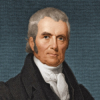John Marshall

John Marshall
John Marshallwas the fourth Chief Justice of the Supreme Court of the United States. His court opinions helped lay the basis for United States constitutional law and many say made the Supreme Court of the United States a coequal branch of government along with the legislative and executive branches. Previously, Marshall had been a leader of the Federalist Party in Virginia and served in the United States House of Representatives from 1799 to 1800. He was Secretary of State under...
NationalityAmerican
ProfessionJudge
Date of Birth24 September 1755
CountryUnited States of America
My gift of John Marshall to the people of the United States was the proudest act of my life. There is no act of my life on which I reflect with more pleasure. I have given to my country a judge equal to a Hole, Holt, or a Mansfield.
It is emphatically the province and duty of the Judicial Department to say what the law is.
The federal government is acknowledged by all to be one of enumerated powers. The principle, that it can exercise only the powers granted to it . . . is now universally admitted.
To obtain a just compromise, concession must not only mutual-it must be equal also....There can be no hope that either will yield more than it gets in return.
Between a balanced republic and a democracy, the difference is like that between order and chaos.
The government of the Union, then, ... is, emphatically, and truly, a government of the people. In form and in substance it emanates from them. Its powers are granted by them, and are to be exercised directly on them, and for their benefit.
An unlimited power to tax involves, necessarily, a power to destroy; because there is a limit beyond which no institution and no property can bear taxation.
The people made the Constitution, and the people can unmake it. It is the creature of their own will, and lives only by their will.
The power to tax is the power to destroy.
The constitution controls any legislative act repugnant to it.
The events of my life are too unimportant, and have too little interest for any person not of my immediate family, to render them worth communicating or preserving.
But in view of the constitution, in the eye of the law, there is in this country no superior, dominant, ruling class of citizens. There is no caste here.
The law regards man as man, and takes no account of his surroundings or of his color when his civil rights as guaranteed by the supreme law of the land are involved.
The Constitution is not a panacea for every blot upon the public welfare. Nor should this Court, ordained as a judicial body, be thought of as a general haven for reform movements.